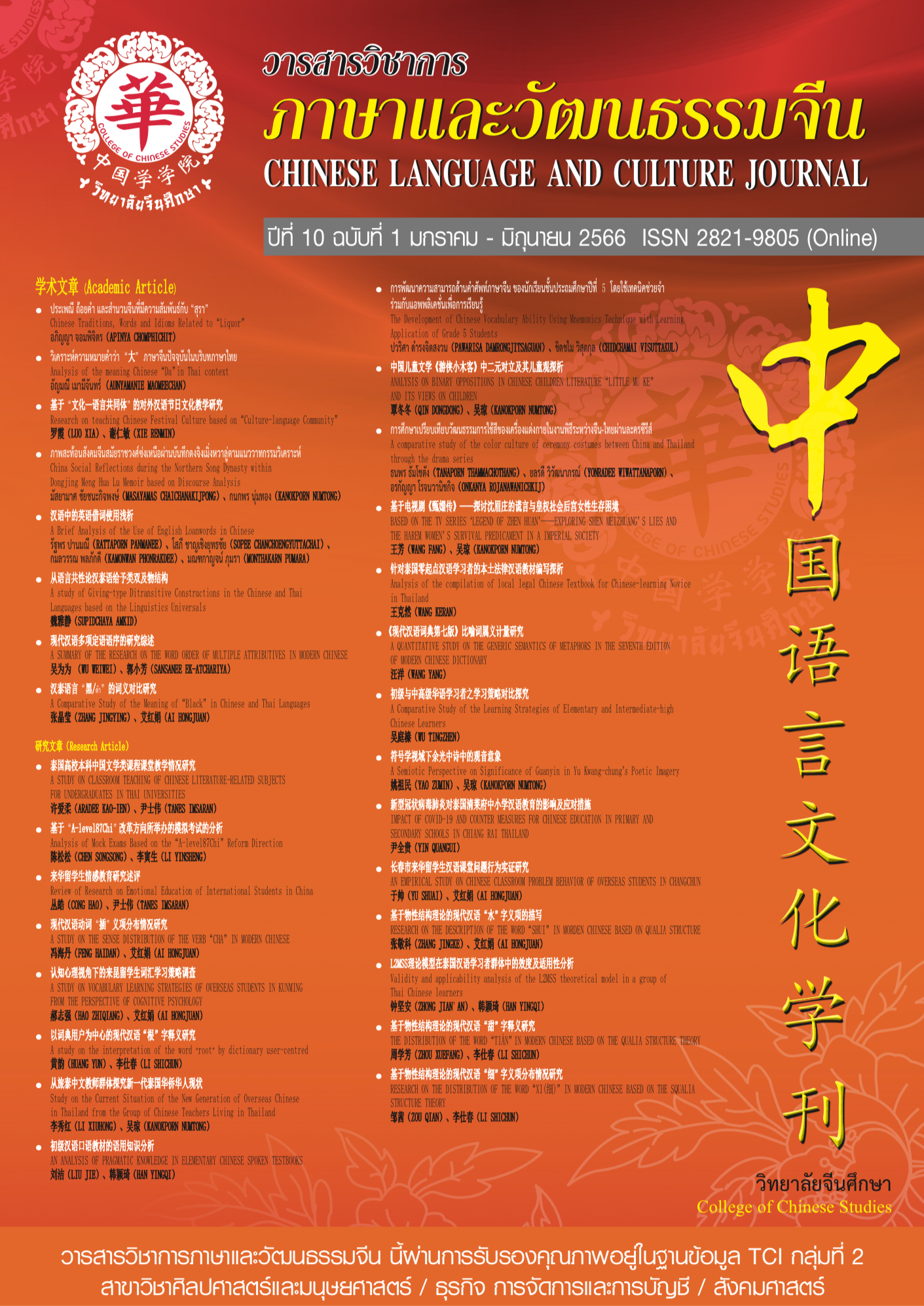Study on the Current Situation of the New Generation of Overseas Chinese in Thailand from the Group of Chinese Teachers Living in Thailand
Keywords:
Thailand, Chinese Teacher, Overseas Chinese, situationAbstract
With the promotion of Chinese language teaching in Thailand, more and more Chinese teachers live in Thailand and become an important part of the overseas Chinese community in Thailand. Exploring this group will help us better understand the current situation of the new generation of overseas Chinese in Thailand. This study conducted in-depth interviews with 16 Chinese teachers living in Thailand in four age groups, explored the current situation and changes of the new generation of overseas Chinese in Thailand by using comparative analysis, and analyzed their internal differences. The results showed that the new generation of Thai overseas Chinese came from a wider range of ancestral places, covering the north and south of China. Most people have more professional skills to make a living. They have a wider circle of friends but are more able to integrate into the local community. Most people stay because they like the comfortable life in Thailand. They rarely change their nationality, and most of them intend to return to China for development. Most people think they are Chinese in cultural identity. Most of the older generation of overseas Chinese live in Thailand because of their families and careers and are willing to change their nationality. However, the new generation of overseas Chinese live in Thailand based on their interests and have not yet considered changing their nationality. The cultural identity of the successful immigrant tends to Thailand.
References
陈雍, 黄晓坚. 传统侨乡海外联系的新动向——潮汕地区磷溪镇、隆都镇个案研究[J].八桂侨刊, 2013, (2): 6
郭平. 中国的东南亚华侨华人研究: 历史、现状与前景——庄国土教授访谈录.[J].东南亚南亚研究, 2012, (01): 88-91
韩震. 全球化时代的华侨华人文化认同问题研究.[J].华侨大学学报(哲学社会科学版),2007,(03):85-90.
何丽英. 泰语中的汉语借词研究: [硕士学位论文]. [D]. 云南: 云南师范大学, 2007
洪林. 泰国侨批史略.[J].汕头大学学报(人文社会科学版), 2007, (04): 77-84+92
黄晓坚. 广东澄海侨情变化与思考.[J].华侨华人历史研究, 2001, (04): 18-29
黄晓坚. 中泰民间关系的演进:以隆都镇为视域的研究.[J].华侨大学学报(哲学社会科学版), 2013, (03): 23-34
江白潮. 对泰国华侨华人现状的探讨.[J]. 东南亚南亚研究, 1991, (2): 7
李益杰. 海外潮汕华侨华人集中于泰国的原因浅析.[J]. 东南亚, 2004, (01): 49-53
吴群,李有江.二战后泰国华侨华人社会的变化.[J].云南师范大学学报(哲学社会科学版), 2004, (05): 62-68
闫静, 章伟婷. 侨批档案与华侨身份认同——以晋江侨批为中心的考察.[J].浙江档案, 2022, (04): 25-29
曾建屏. 泰国华侨经济.[M]. 台湾: 海外出版社, 1956. 115-116
周聿峨, 龙向阳.华侨华人与国际关系. [M]. 厦门: 厦门大学出版社, 2012. 160-183
朱芮. 二十世纪以来泰国华侨华人社团对泰中关系的影响研究: [硕士学位论文]. [D]. 广州: 暨南大学, 2020
庄国土. 东南亚华侨华人数量的新估算.[J].厦门大学学报(哲学社会科学版), 2009, (3): 8
庄国土. 世界华侨华人数量和分布的历史变化.[J].世界历史, 2011, (05): 4-14+157
Dalad Lomatawekul. Ethnic Identification of the Second- Generation Chinese in Thailand. Thesis (M.Ed.).[D].Bangkok: Chulalongkorn University, 1968.
Landon Kenneth Perry. The Chinese in Thailand. [M]. London. New York: Oxford University Press, 1941.
Richard J.Coughlin. The Chinese in Bangkok: A Commercial- Oriented Minority.[J].American Sociological Review, 1955, Vol.20.No.3: 311-316
Tiparat Sohumrum. The Psychological Assimilation of the Second- Generation Chinese in Thailand: Thesis (M.Ed.).[D].Bangkok: Chulalongkorn University, 1968.
Downloads
Published
How to Cite
Issue
Section
License
Copyright (c) 2023 Chinese Language and Culture Journal

This work is licensed under a Creative Commons Attribution-NonCommercial-NoDerivatives 4.0 International License.
บทความที่ได้รับการตีพิมพ์เป็นลิขสิทธิ์ของวารสารภาษาและวัฒนธรรมจีน มหาวิทยาลัยหัวเฉียวเฉลิมพระเกียรติ
บทความใน “วารสารวิชาการภาษาและวัฒนธรรมจีน” เป็นทรรศนะของผู้เขียนโดยเฉพาะ กองบรรณาธิการไม่มีส่วนในความคิดเห็นในข้อเขียนเหล่านั้น




